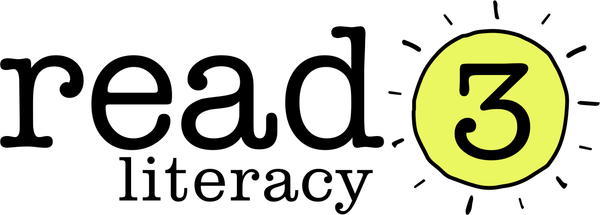About Read3
Read3 is a literacy intervention for beginner and struggling readers that systematically builds three foundational skills essential for reading development.
Phonics programs are recommended when learning to read, however many young children are just not ready for that step. If a child can't connect letters to sounds or read simple sight words, they are most likely missing foundational skills. Read3 is a module-based, integrated program that works to build these foundational skills. All activities, resources, videos and scripts are included.
As recommended in research from Tufts, MIT and Harvard Universities, Read3 addresses a wide range of processing difficulties including the impact of poor rapid automatic naming (RAN) and phonological working memory (PM) on reading fluency.
By working on three core areas, in an integrated way,
Read3 systematically builds a strong reading circuit.
|
Continually strengthen phonological awareness |
|
|
Build strong word recognition with phonics In SEE activities children are introduced to systematic synthetic phonics. They will start to read and spell by blending and segmenting word parts based on natural sound patterns, accommodating working memory and rapid naming (RAN) weaknesses. |
|
|
Improve reading fluency |
Children complete 3 activities every session
20 minutes a day, five days a week.
Our parent-friendly 3-step formula includes:

Each session, simply choose and complete one activity from each core area - HEAR + SEE + AUTO.

Resources, instructions and scripts for every activity can be downloaded in PDF form via a personal login.
At the completion of the three activities, children will then apply learning using decodable readers and other carefully curated resources.
Neuro-scientific reading research that has been
tried and tested in a literacy clinic
The Read3 intervention strategies are derived from 25 years of neuro-scientific reading research, practically applied and trialled by an experienced speech pathologist in a clinical setting with children with severe reading disorders. These evidence-based strategies were compiled by a communications specialist, and parent of a dyslexic child, into a simple and accessible format.
Specialist educational services and speech pathology clinics are adding the Read3 program to their professional toolkit to provide individualised instruction for children with multiple processing difficulties. The program can also be delivered at school in a learning support setting by a teacher aide or at home by a parent or carer.
Features of Read3

Module-based system
We have divided the reading program into Modules and Steps which enables us to introduce children to concepts slowly and focus on mastery at every stage for early reading success. Quite simply, if a child can’t automatically recall the content of their current step, they aren’t ready to move on.
![]()
Quick 3-step lessons
Each day you’ll be working on 3 core skills with your child. Our lesson plans are easy to follow and all materials can be accessed online. You'll progress through a a range of activities to keep your child interested and motivated. Having a caring and committed adult is vital for reading progress to occur. Regular practise is essential – a minimum of 20 minutes a day, 5 times a week.
![]()
Video instruction
Each lesson plan starts with a short video to help you gain a clear understanding of the purpose of the lesson. You’ll be hearing direct from Robyn, experienced speech pathologist and Co-creator of Read3.

Keep it fun
Daily games are the foundation of our learning system. Within each module we offer a variety of multi-sensory games and activities that build the foundations of reading step-by-step. Flip a card, cut up a rhyme strip, toss a dice and watch your child’s understanding and skills improve.
![]()
Convenient, online access
Your personal website login provides direct access to videos, lesson plans, scripts, games and activities. Simply click to view/print PDF files as needed for each session.

Monitor daily and keep on track
Document progress daily so you know when it's time to move on. Record sheets also provide excellent feedback for professionals, and for NCCD as needed.

Decodable readers and extra resources, curated for you!
There are millions of literacy resources out there and knowing what to pick can be overwhelming. We provide expert guidance as to which resources or websites can be used in conjunction with each step in our program to practise skills learned. Details on matched decodable readers is also provided.
